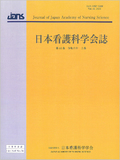Japanese
English
- 販売していません
- Abstract 文献概要
- 参考文献 Reference
要旨
目的:本研究は,悪性脳腫瘍患者の家族が治療方針や療養生活に関する代理意思決定をする際に,何を手がかりに決定に至ったのかを明らかにすることを目的とした.
方法:悪性脳腫瘍患者の家族7名に対して半構造化面接を実施し,回答を内容分析して「治療方針」と「療養生活」に関する決定の際の手がかりを抽出した.
結果:「治療方針」決定の手がかりでは6のテーマ,「療養生活」決定の手がかりでは7のテーマを生成した.手がかりの特徴として,過去に得られた患者の言葉や,様々な反応から推定した患者の意思,家族自身の価値観,就労や役割に関すること,家族が引き出した患者の思いを重視していることが挙げられた.
結論:悪性脳腫瘍患者の家族の代理意思決定に関わる看護師は,発症早期から家族とともに患者の小さな反応から手がかりを見つけ,それをチームで共有し,家族の援助行動につながるような手がかりを提供することが必要であると考える.
Objective: This study aimed to clarify what clues family members of patients with malignant brain tumors relied on when making proxy decisions regarding treatment options and caregiving lifestyles.
Methods: Semi-structured interviews were conducted with seven family members of patients with malignant brain tumors to analyze the clues used during decision-making regarding "treatment options" and "caregiving lifestyles."
Results: Six themes were generated for clues used in decision-making about "treatment options," and seven themes were generated for clues used in decision-making about "caregiving lifestyles." The characteristics of these clues included patient's past statements, inferred patient preferences from various reactions, family values, employment and roles, and the patient's expressed thoughts drawn out by the family.
Conclusion: Nurses involved in proxy decision-making for family members of patients with malignant brain tumors should start identifying clues from the patient's early stages of onset, share them within the team, and provide clues that lead to supportive actions by the family.
Copyright © 2024, Japan Academy of Nursing Science. All rights reserved.


